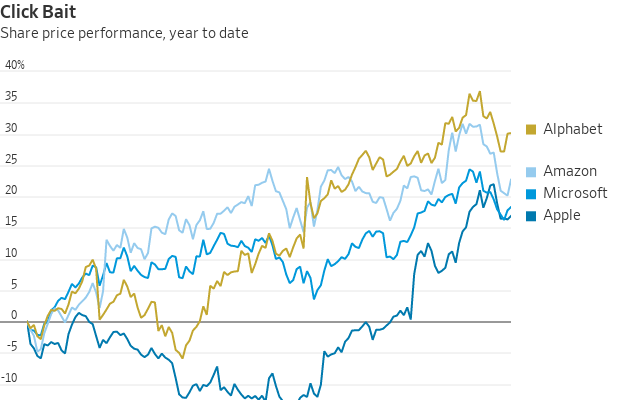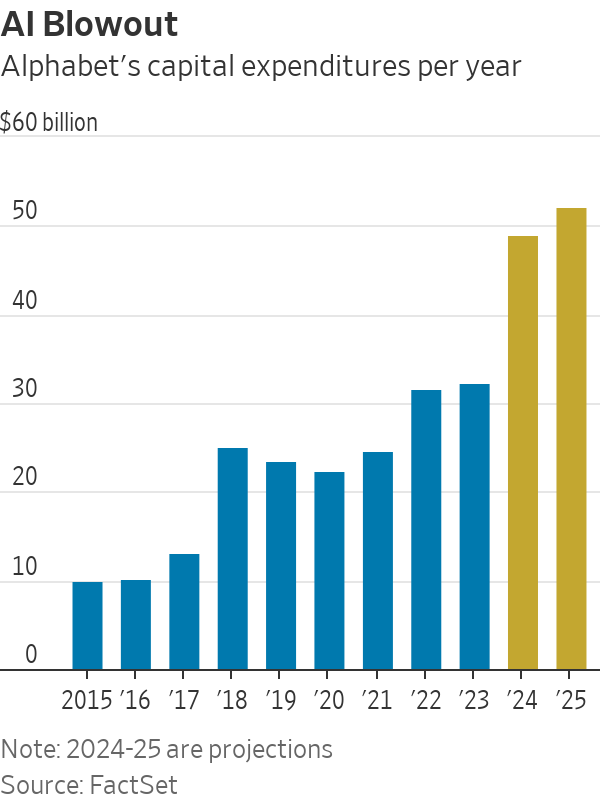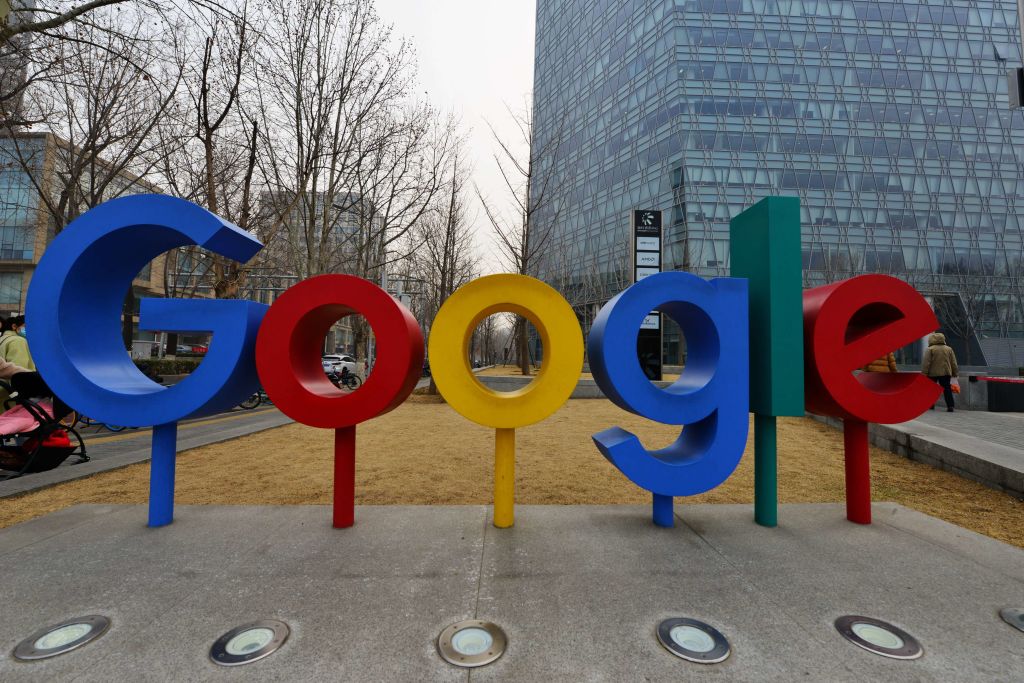Google Fails to ‘Wow’ as AI Bills Mount
Advertising business faces tough growth comparisons, while AI spending continues to surge
It’s good to be Google these days. But it isn’t easy, and it will keep getting harder.
Second-quarter results from parent company Alphabet on Tuesday afternoon showed strength in advertising and cloud revenue along with a record high in operating profit as the Silicon Valley titan, once known for lavish employee perks, continues to clamp down on most costs, save for those designed to build out generative artificial intelligence capabilities .
But the results also offered “no excitement,” in the words of Jefferies analyst Brent Thill . Overall revenue exceeded Wall Street’s consensus projection by just 0.6%—the lowest beat percentage in at least five years, according to FactSet. YouTube advertising revenue also came in lower than analysts expected. Alphabet’s previous report, three months ago , offered bigger positive surprises in both revenue and earnings growth, with the announcement of the company’s first-ever dividend thrown in for good measure. Alphabet’s stock had jumped nearly 17% since that report; the shares gave up about 4% in premarket trading on Wednesday.
Tuesday’s results also set the stage for what might be a more challenging second half of the year. For one, comparisons will be tougher as the second half of last year had Google nearly recovered from an earlier advertising slump. Google also didn’t fully ramp up its spending on AI infrastructure until well into the second half of 2023; capital expenditures in the first half of 2023 were barely half of the $25.2 billion the company has spent in the first half of this year.
That spending won’t be taking a breather any time soon, even as Google has pared back other costs and even brought its head count down by more than 1,300 positions in the most recent quarter. Alphabet said Tuesday that capex will be at or above $12 billion a quarter for the second half of the year, likely leading to a total outlay of more than $49 billion for the year—84% higher than what the company has averaged annually over the past five years.

“Look, obviously we are at the early stage of what I view as a very transformative area,” Alphabet Chief Executive Sundar Pichai said during Tuesday’s earnings call when asked by an analyst about the company’s AI investments. He added that “the risk of underinvesting is dramatically greater than the risk of over investing for us here,” not mentioning the record amounts of capex that tech rivals Microsoft , Amazon.com and Meta Platforms are pouring into the same thing.
Google has the resources: Alphabet’s net cash pile of nearly $98 billion is substantially bigger than those of even its deep-pocketed peers. But putting that money to work is getting to be a challenge. The Wall Street Journal reported Monday that Google’s talks to acquire cybersecurity startup Wiz have fallen apart. The purported $23 billion deal would have been Google’s largest ever and most certainly would have drawn the type of close regulatory scrutiny that has lately been keeping tech mergers in limbo for 18 months or more. Such an uncertain payoff reportedly was a concern among Wiz and its investors; Google’s acquisition of Fitbit in 2021 for less than one-tenth that price took nearly 15 months to close.

Google is also going back to the drawing board on a long-running plan to phase out the use of internet tracking technology known as “cookies,” despised by privacy advocates but depended upon by advertisers. Google was building up an alternative technology called “privacy sandbox,” but that plan drew a lot of opposition from advertisers and regulators worried that it would further cement the company’s internet advertising dominance. Google said Monday it would instead offer users a prompt to allow them to opt out of cookie tracking.
That move is unlikely to dent Google’s powerful search ad business. But that and the failed Wiz talks show the growing constraints the company is operating under as regulators look even more closely at big tech’s position, and judges and juries start weighing in. A verdict in the federal government’s antitrust case against Google is expected before the end of the year and could result in a ruling that would seek a breakup of the $250-billion-a-year advertising juggernaut.
Google’s latest results were good, but good isn’t always enough.
 Copyright 2020, Dow Jones & Company, Inc. All Rights Reserved Worldwide. LEARN MORE
Copyright 2020, Dow Jones & Company, Inc. All Rights Reserved Worldwide. LEARN MORE
A divide has opened in the tech job market between those with artificial-intelligence skills and everyone else.
A 30-metre masterpiece unveiled in Monaco brings Lamborghini’s supercar drama to the high seas, powered by 7,600 horsepower and unmistakable Italian design.
A divide has opened in the tech job market between those with artificial-intelligence skills and everyone else.
There has rarely, if ever, been so much tech talent available in the job market. Yet many tech companies say good help is hard to find.
What gives?
U.S. colleges more than doubled the number of computer-science degrees awarded from 2013 to 2022, according to federal data. Then came round after round of layoffs at Google, Meta, Amazon, and others.
The Bureau of Labor Statistics predicts businesses will employ 6% fewer computer programmers in 2034 than they did last year.
All of this should, in theory, mean there is an ample supply of eager, capable engineers ready for hire.
But in their feverish pursuit of artificial-intelligence supremacy, employers say there aren’t enough people with the most in-demand skills. The few perceived as AI savants can command multimillion-dollar pay packages. On a second tier of AI savvy, workers can rake in close to $1 million a year .
Landing a job is tough for most everyone else.
Frustrated job seekers contend businesses could expand the AI talent pipeline with a little imagination. The argument is companies should accept that relatively few people have AI-specific experience because the technology is so new. They ought to focus on identifying candidates with transferable skills and let those people learn on the job.
Often, though, companies seem to hold out for dream candidates with deep backgrounds in machine learning. Many AI-related roles go unfilled for weeks or months—or get taken off job boards only to be reposted soon after.
Playing a different game
It is difficult to define what makes an AI all-star, but I’m sorry to report that it’s probably not whatever you’re doing.
Maybe you’re learning how to work more efficiently with the aid of ChatGPT and its robotic brethren. Perhaps you’re taking one of those innumerable AI certificate courses.
You might as well be playing pickup basketball at your local YMCA in hopes of being signed by the Los Angeles Lakers. The AI minds that companies truly covet are almost as rare as professional athletes.
“We’re talking about hundreds of people in the world, at the most,” says Cristóbal Valenzuela, chief executive of Runway, which makes AI image and video tools.
He describes it like this: Picture an AI model as a machine with 1,000 dials. The goal is to train the machine to detect patterns and predict outcomes. To do this, you have to feed it reams of data and know which dials to adjust—and by how much.
The universe of people with the right touch is confined to those with uncanny intuition, genius-level smarts or the foresight (possibly luck) to go into AI many years ago, before it was all the rage.
As a venture-backed startup with about 120 employees, Runway doesn’t necessarily vie with Silicon Valley giants for the AI job market’s version of LeBron James. But when I spoke with Valenzuela recently, his company was advertising base salaries of up to $440,000 for an engineering manager and $490,000 for a director of machine learning.
A job listing like one of these might attract 2,000 applicants in a week, Valenzuela says, and there is a decent chance he won’t pick any of them. A lot of people who claim to be AI literate merely produce “workslop”—generic, low-quality material. He spends a lot of time reading academic journals and browsing GitHub portfolios, and recruiting people whose work impresses him.
In addition to an uncommon skill set, companies trying to win in the hypercompetitive AI arena are scouting for commitment bordering on fanaticism .
Daniel Park is seeking three new members for his nine-person startup. He says he will wait a year or longer if that’s what it takes to fill roles with advertised base salaries of up to $500,000.
He’s looking for “prodigies” willing to work seven days a week. Much of the team lives together in a six-bedroom house in San Francisco.
If this sounds like a lonely existence, Park’s team members may be able to solve their own problem. His company, Pickle, aims to develop personalised AI companions akin to Tony Stark’s Jarvis in “Iron Man.”
Overlooked
James Strawn wasn’t an AI early adopter, and the father of two teenagers doesn’t want to sacrifice his personal life for a job. He is beginning to wonder whether there is still a place for people like him in the tech sector.
He was laid off over the summer after 25 years at Adobe , where he was a senior software quality-assurance engineer. Strawn, 55, started as a contractor and recalls his hiring as a leap of faith by the company.
He had been an artist and graphic designer. The managers who interviewed him figured he could use that background to help make Illustrator and other Adobe software more user-friendly.
Looking for work now, he doesn’t see the same willingness by companies to take a chance on someone whose résumé isn’t a perfect match to the job description. He’s had one interview since his layoff.
“I always thought my years of experience at a high-profile company would at least be enough to get me interviews where I could explain how I could contribute,” says Strawn, who is taking foundational AI courses. “It’s just not like that.”
The trouble for people starting out in AI—whether recent grads or job switchers like Strawn—is that companies see them as a dime a dozen.
“There’s this AI arms race, and the fact of the matter is entry-level people aren’t going to help you win it,” says Matt Massucci, CEO of the tech recruiting firm Hirewell. “There’s this concept of the 10x engineer—the one engineer who can do the work of 10. That’s what companies are really leaning into and paying for.”
He adds that companies can automate some low-level engineering tasks, which frees up more money to throw at high-end talent.
It’s a dynamic that creates a few handsomely paid haves and a lot more have-nots.
ABC Bullion has launched a pioneering investment product that allows Australians to draw regular cashflow from their precious metal holdings.
When the Writers Festival was called off and the skies refused to clear, one weekend away turned into a rare lesson in slowing down, ice baths included.























